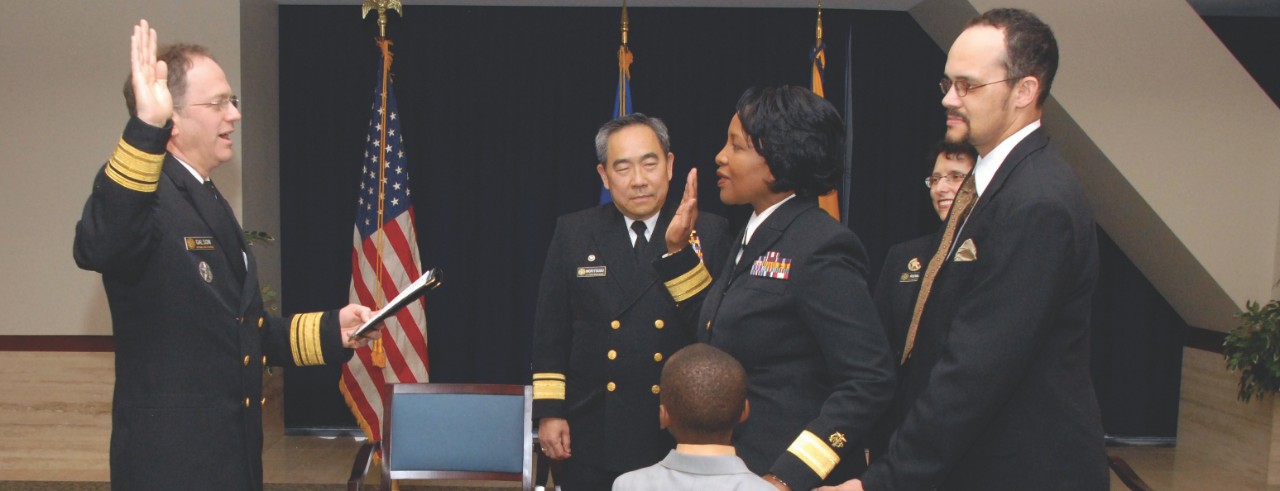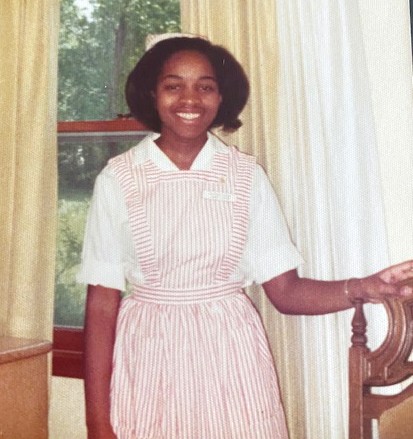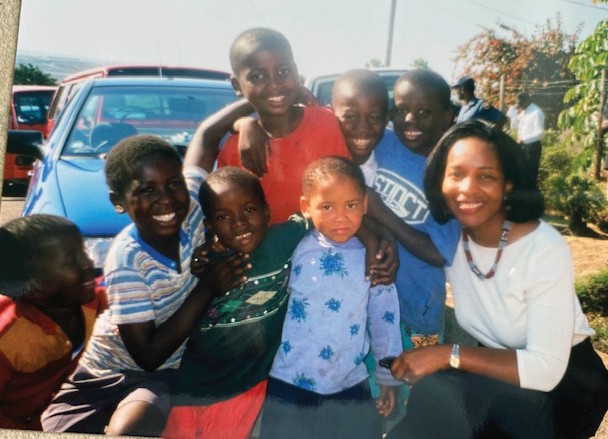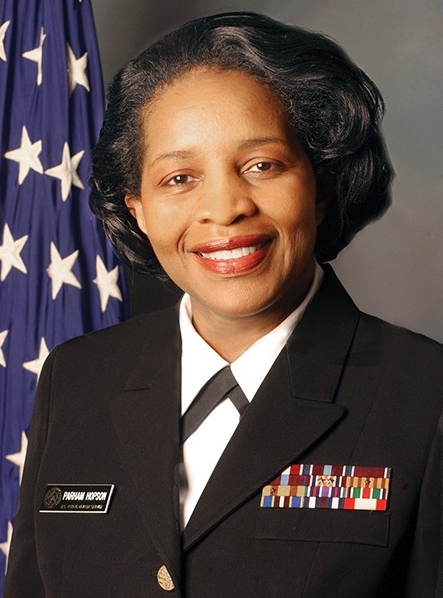
UC alumna commands federal HIV/AIDS care, breaks barriers for Black service members
Deborah Hopson, NUR '77, served 34 years in the U.S. Public Health Service Commissioned Corps
By: Katie Coburn
Deborah Parham Hopson says helping others through public service is her ministry and mission. When she graduated from UC with a Bachelor of Science in Nursing (BSN) in 1977, she could not have predicted where her nursing education would take her or how many lives she would impact throughout her career. From leading an international HIV/AIDS program to becoming the first Black nurse to achieve the rank of Rear Admiral in the U.S. Public Health Service Commissioned Corps (PHSCC), Hopson has an impressive resume of accolades — and it all started with her decision to pursue nursing at UC.
"I had no idea my nursing career would take me in all the different directions it did, but I was open to the challenges and opportunities when they were presented," says Hopson, PhD, RN, FAAN, who now serves as a senior public health scientist at The MayaTech Corporation, a social services consulting firm, where she consults on projects involving infectious disease prevention and treatment and leads a project focused on public health workforce training and development.
A pull toward public health

Alumna Deborah Hopson in 1972 in her hospital volunteer uniform.
Health was a common conversation topic in Hopson’s family, thanks to her father, a veterinarian, and her mother, a nurse and Hopson’s first nursing role model. One of Hopson’s earliest memories of her mother involves watching her administer polio vaccines to children while donning a white uniform and nursing cap in the early 1960s. During high school, Hopson experienced nursing firsthand when she volunteered as a candy striper (now called a junior volunteer) at Nationwide Children’s Hospital in Columbus, Ohio. Ultimately, the job security nursing provides and UC’s direct-admission program were what convinced Hopson to pursue a nursing career.
During her final year in the BSN program, a community health clinical rotation helped Hopson realize that she preferred public health to bedside nursing. Learning about the social determinants of health that prevent underserved populations from accessing care inspired her to want to work with low-income populations and someday open a community health clinic. After earning her BSN, she pursued a master's degree in public health at University of North Carolina at Chapel Hill, where she also earned her PhD in health policy and management.
A home in health policy

Hopson with children in South Africa, one of the international locations for which she provided public health guidance as senior health advisor to the administrator of HRSA
Rather than open a clinic, Hopson chose to work in health policy, broadening her impact on health care. Before joining MayaTech in 2018, she served as a senior health advisor to the administrator for the Health Resources and Services Administration (HRSA) in the U.S. Department of Health and Human Services, the primary federal agency responsible for improving access to health care services for uninsured, isolated or medically vulnerable populations — which includes providing funding for community health clinics across the country. During the five years she held this role, Hopson provided guidance on national and global public health issues, programs, policies and initiatives with an emphasis on HIV/AIDS.
Nursing teaches you a way to think. How you assess a patient is the same for how you assess a community.
Deborah Parham Hopson, PhD, RN, FAAN NUR '77
Hopson was introduced to HIV/AIDS research in the early ’90s, soon after she finished her PhD. As a commissioned officer of PHSCC, a post she assumed in 1984, she was assigned to oversee the program evaluation of a section of the Ryan White HIV/AIDS Program (RWHAP) at HRSA. She climbed the ranks to eventually oversee the entire $2.4 billion program as director of HRSA’s HIV/AIDS Bureau (HAB). RWHAP, the largest federal program focused on HIV, funds HIV care and treatment services for low-income people who are often uninsured or underserved. During her 11 years as director of the HAB, Hopson provided grant support to 800-plus programs that served more than 550,000 people living with HIV throughout the U.S., Puerto Rico and U.S. Territories. Additionally, as part of the President’s Emergency Plan for AIDS Relief, Hopson was instrumental in providing clinical nursing expertise on how to establish a $300 million HIV/AIDS program in parts of Africa, Asia and the Caribbean.
"Because I had a nursing background, I understood what HIV is as a disease and how it impacts patients,” Hopson says. “When working with Congress, my degrees in health policy and management helped me navigate what the HIV programs needed to be in order to take care of poor people who didn’t have any other access to care. It was great to bring together what I learned in my various programs, starting with nursing.”
UC College of Nursing also taught Hopson that developing a successful patient care plan or community program requires listening to the patient or the people who will be most impacted and using their input to inform and support the development.
"Nursing teaches you a way to think. How you assess a patient is the same for how you assess a community," she says. “You learn the strengths of a patient or the strengths within a community, and then you build on those strengths to develop a patient care plan or community program. That was the kind of thinking that I used throughout my career."
An open door for others

After dedicating 34 years to PHSCC, Hopson "retired" in 2018, taking only the summer off before joining MayaTech. She says she experienced a lot of highlights during her career, including becoming the first Black nurse to achieve the rank of Rear Admiral, an accomplishment achieved by less than 1% of all PHSCC officers.
"Once I became an admiral, I did not want to be the only African-American to achieve that rank, so I helped a lot of nurses, particularly African-American nurses, to achieve it," she says. "I can think of at least 10 of us who did, so I broke the glass ceiling, but I made sure it stayed broken."
Hopson retired from federal service to give others a chance to step in and bring new ideas to the agency. Although her new position is different from her last, she continues to impact lives both professionally and in her spare time. A resident of Silver Spring, Maryland, Hopson serves on the Montgomery and Prince George’s Counties’ Hospice Board of Directors, the Planned Parenthood Federation of America Board of Directors and the American Baptist Churches International Ministries Board of Directors. She says she will officially retire when the time is right, but she is always open to another opportunity: "I'm very open to retiring and sitting down, but various opportunities come along, and we’ll see what happens."
Featured image at top: Hopson at her promotion ceremony to Rear Admiral in the PHSCC in 2009. She was the first Black nurse in the uniformed service to achieve the rank. Photo/Submitted
Related Stories
UC shares plan for start of fall semester
June 11, 2020
UC will follow enhanced health and safety measures as it begins with blend of in-person and virtual offerings for fall semester 2020.
UC closed Friday in honor of Juneteenth
June 17, 2021
The University of Cincinnati will be closed on Friday, June 18 in honor of federal government's decision to mark Juneteenth as a public holiday.
The making of a successful Faculty & Staff Campaign
May 25, 2021
More than one-third of UC’s nearly 7,000 faculty and staff have already contributed to the 2020-21 Faculty & Staff Campaign, putting the goal of 45% within reach.